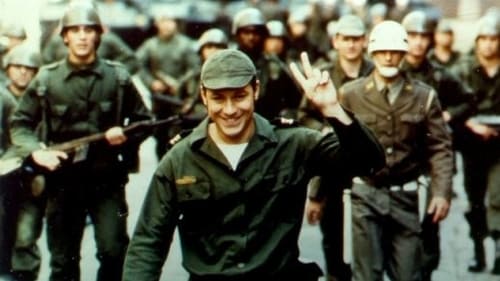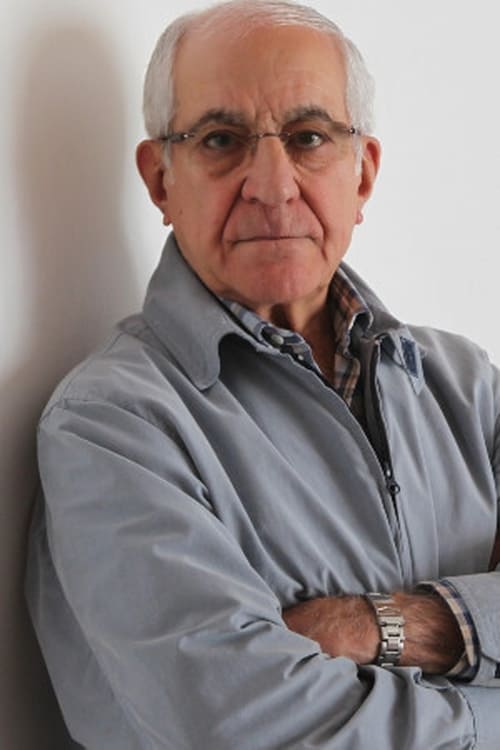Otelo Saraiva de Carvalho
Nascimento : , Lourenço Marques, Portuguese Mozambique
História
Otelo Nuno Romão Saraiva de Carvalho, is a retired Portuguese military officer. He was the chief strategist of the 1974 Carnation Revolution in Lisbon. After the Revolution, Otelo assumed leadership roles in the first Portuguese Provisional Governments, alongside Vasco Gonçalves and Francisco da Costa Gomes, and as the head of military defense force COPCON. In 1976, Otelo ran in the first Portuguese presidential election, in which he placed second with the base of his support coming from the far-left. In the 1980s Otelo was accused of having involvement with the controversial Forças Populares 25 de Abril.

Self
Documentário sobre a aquisição de telefones para o Posto de Comando do MFA, assim como a montagem de um cabo de transmissões que teria de ser prolongado do Colégio Militar até ao Posto de Comando (PC), instalado na Pontinha.

Self (revolutionary captain)
The operational commander of the "Captains Movement", describes and recreates a quarter of century later the crucial 24 hours of April 25, 1974, that would topple the Portuguese government and start a democratic regime in Portugal - since another military coup, May 28, 1926, installed a one-party dictatorship there. The scenes in the claustrophobic operation room are recreated, with him alone and a few voices.

Oscar (uncredited)
Um retrato da Revolução dos Cravos, que mudou a história portuguesa na década de 70. A realizadora e actriz Maria de Medeiros faz um retrato pessoal e nostálgico dos episódios mais marcantes do 25 de abril.

Himself
A dozen of the revolutionary Army officers that played eminent parts in the change of political regime in Portugal, from a military dictatorship to a social-democracy, read a book to a young girl, describing in a poetic, yet realistic way, what happened in the streets, and minds, of her People in April 25, 1974.

Mayor
Rui Sequeira, a former fighter in the Colonial War, resident of a small village of Alentejo, celebrates another anniversary of the Carnation Revolution in the company of his wife and her daughter, the young Sara, with which he has a not so good relationship. On the night of the celebrations, the death of a friend forever alters his live, waking up a whole past long dormant.

Self
The colonial war. Remembering the past, filming the present, thinking about the future. Collection of testimonies of ex-combatants still alive and archival footage.

Documentário em que são abordados cronologicamente os principais acontecimentos que marcaram o país e a sociedade portuguesa nos anos de 1974 e 1975. A decadência do regime Marcelista, a Revolução do 25 de Abril de 74, o período conturbado do Processo Revolucionário Em Curso (PREC), o fracasso do Golpe de 25 de Novembro de 75. Um programa produzido com base em imagens de arquivo, intercaladas com depoimentos de alguns dos intervenientes nos acontecimentos dessa época, para assinalar os 20 anos da Revolução dos Cravos.

Writer
"Essay on the Military and the Power", a phrase that also belongs to the title of "Gestures & Fragments", sums up the spirit of the film, based on three points of view on the same theme: Otelo Saraiva de Carvalho and Eduardo Lourenço, in their own roles, and the one played by Robert Kramer, as an American journalist bent on seeking explanations for the process of the Portuguese Revolution.

Himself
"Essay on the Military and the Power", a phrase that also belongs to the title of "Gestures & Fragments", sums up the spirit of the film, based on three points of view on the same theme: Otelo Saraiva de Carvalho and Eduardo Lourenço, in their own roles, and the one played by Robert Kramer, as an American journalist bent on seeking explanations for the process of the Portuguese Revolution.

Himself (revolutionary captain)
O filme procura traçar a história entre o 25 de Abril de 1974 e o 25 de Novembro de 1975, tal como ela foi sentida pela equipa que, ao longo deste processo, foi ao mesmo tempo espetador, ator e participante, mas que, sobretudo, se encontrava totalmente comprometida com o processo revolucionário em curso.

Self (archive footage) (uncredited)
Porque todos os filmes reflectem, de algum modo, quem os faz, Oxalá não foge à regra. Só que, aqui, o cinema assume esse facto, acentua uma certa confessionalidade mostra-se. O lado simpático de Oxalá é essa disponibilidade. É muito claro que este é um filme que se sente mal na sua pele portuguesa do final dos anos 70, que vive fixado, adolescentemenre, na França da Nouvelle Vague. O seu exilado que atravessa, entre o perto e a distância os anos de Abril é, por isso, mais um estrangeiro que um compatriota, alguém cujo descentramento, em relação à realidade portuguesa, é total. Daí que nenhum dos seus gestos tenha consequências, daí que, visivelmente, ele não esteja disposto a pagar nenhum preço pela vida, nem se quer o preço do amor. Dai a impotência. O equívoco.

Self (uncredited)
The daily experiences of many antifascists - who suffered, until the political prison, which sealed his esteem and united them in a covenant of justice against a "pide" assassin (eted). But the April 25 and May 1, to September 28 and March 11, follows the November 25 - striking dates a forthcoming story. Time caused the wear of the revolutionary process, exacerbating social and economic problems. In the intellectual groups of the left, where the ideological coherence flew over the everyday practice, is dug a crisis of identity and options. An early vote, perhaps radical, unites -still - a determined activist and a journalist who wonders ...


